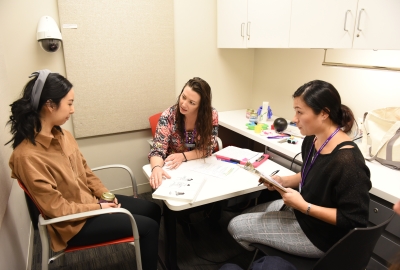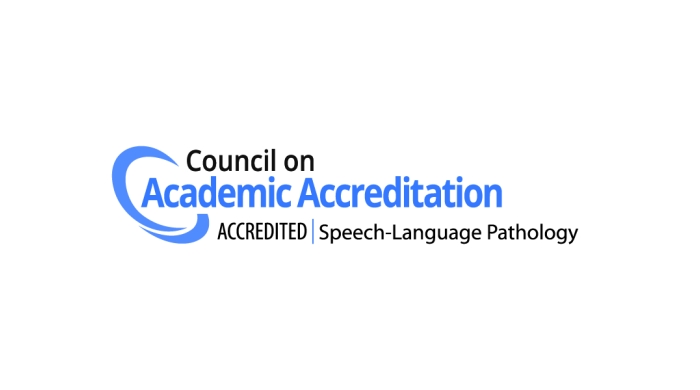
Following the completion of core disorder courses, graduate student clinicians participate in a five-step Clinical Practicum and Field Placement Sequence (Practicum I-V) which consists of both on-campus and off-campus clinical experiences to prepare them to be well-rounded speech-language pathologists. Each step in the sequence is a full term in length.
After the Clinical Practicum and Field Placement Sequence, students will have completed clinical learning in at least three different settings that include exposure across the nine disorders and lifespan, with the first experience being the NYU Speech-Language-Hearing Clinic. The NYU CSD program is a generalist program and does not offer specific tracks based on interest areas (e.g. medical, school, etc.). All experiences must be completed under the supervision of a licensed and certified speech-language pathologist who meets the American Speech-Language-Hearing Association (ASHA) standards on supervision.
Direct Contact Hours
Our national governing body, ASHA requires that students complete 25 guided clinical observation hours before beginning the Clinical Practicum and Field Placement Sequence. They are then required to complete a minimum of 375 direct contact hours to be eligible for certification and professional licensure.
Each step in the Clinical Practicum and Field Placement sequence Practicum course coincides with a different immersive clinical experience either at the NYU Speech-Language-Hearing Clinic or an off-campus field placement, which includes experience in a school setting. This allows for students to meet the necessary New York state requirements for the Teaching Students with Speech and Language Disabilities (TSSLD) certification, which is a requirement for all students enrolled in our program. This includes:
- 150 direct contact hours (treatment and diagnostic) with students with speech and language disabilities from early childhood to adolescence.
- Supervision is provided by a speech-language pathologist who has their TSSLD or TSHH, or state equivalent certification.
- All students must earn a minimum total of five diagnostic hours over the Clinical Practicum and Field Placement Sequence (Practicum I-V). It is to a student's advantage to surpass the minimum direct contact hour requirements.
Students seeking teacher or state certification outside of NY State should refer to the Professional Licensure page for additional information individual state requirements may differ.
Practicums I-III: NYU Speech-Language-Hearing Clinic
For Clinical Practicum I-III, students will primarily be in our NYU Speech-Language-Hearing Clinic. The opportunities presented allow student clinicians to apply their knowledge from coursework to a variety of clinical cases across the lifespan. Please refer to the NYU Speech-Language-Hearing Clinic webpage for specific information.
On average, students earn approximately 75 direct contact hours. They are expected to attend the NYU Speech-Language-Hearing Clinic up to five days per week.
Specialty Clinics During Practicums I-III
Students also have the unique opportunity to work under the supervision of NYU adjunct and clinical faculty at a variety of partner sites throughout Practicums I-III. This may include:
- Terrance Cardinal Cooke (TCC)- Graduate student clinicians in Practicum I provide both group and individual diagnostics, screenings, and intervention to patients with Huntington's Disease.
- Gigi's Playhouse - Graduate student clinicians in Practicum I-III have the opportunity to work with Gigi Playhouse members in a group setting fostering leadership and self-advocacy.
- Lenox Hill Neighborhood House - Graduate student clinicians in the Bilingual Extension (BE) track, provide speech and language services to multilingual preschoolers in an early childhood setting through both group and individual sessions. The experience is extended to non-BE track students when space is available.
- Creative Steps University Settlement - Practicum II & III graduate student clinicians have the opportunity to provide speech and language enrichment and screenings to pre-schoolers in a school settings.
Practicums IV-V: Field Placements
Off-campus field placements provide students with the opportunity to synthesize and apply their theoretical and clinical knowledge to continue "learning by doing" in one primarily pediatric (Practicum IV) setting and one adult or a mixed-age population (Practicum V) setting. These term-long experiences allow students to further advance their clinical and professional competencies as outlined by the Council of Academic Programs in Communication Disorders.
Each field placement experience is:
Full-time
- Requires a student to attend 3-5 days per week, 35+ hours per week (does not include work that is required outside of your time at your field placement [e.g. planning, outside research, etc.].
- The weekly cadence of each field placement is at the discretion of the field placement, in alignment with these requirements
- A semester in length
- Can range from 12-16 weeks depending on site requirements
- Exact start/end dates are at the discretion of the field placement, in alignment with this requirement
Working during field placements is strongly discouraged due to the demanding schedule and workload requirements of the field placement in addition to academic elective and practicum course assignments; when students are in the field, their field placement schedule must be prioritized. It is recommended that students plan for these full-time field placement experiences several semesters before entering the field placement sequence. This includes but is not limited to establishing child or elder care, etc.
Students complete their field placements in various settings, such as hospitals, private practices, skilled nursing facilities, rehabilitation clinics, public schools, or specialized schools designed to meet the unique needs of children with various disabilities, and other settings. Students must arrange their schedules so that they are flexible to travel to their field placement. Field placements are located throughout the five boroughs, Long Island, Upstate New York, New Jersey, and Connecticut. Attempts to consider field placements specific to location and travel convenience are made. However, it does not guarantee sites near the students’ home, NYU campus, or points in between. All travel to and from the field placement locations, including but not limited to lodging, is at the student’s expense.
The Clinical Field Placement Team, is a dedicated group of speech-language pathologists with many connections across the NYC Metro Area, and works diligently to ensure that all students are properly placed. The Clinical Field Placement Team holistically matches students to potential sites and assigns the student the responsibility of setting up and preparing for their interview. Selection of a student for field placement is highly competitive and ultimately determined by the site. The Clinical Field Placement Team works closely with the Clinic Director, Academic Advising Team, and clinical and academic faculty members to determine which sites are appropriate for students based on their clinical skills and their academic needs. Students do not solicit their own field placements, but can submit a referral for the team to explore and vet accordingly.
Please contact csdfieldplacement@nyu.edu for additional information.
Background Checks: Coverage
In accordance with applicable law and department guidelines, the Department of Communicative Sciences and Disorders (“CSD”) at the New York University Steinhardt School of Culture, Education, and Human Development will require background checks for all students enrolled in the MS degree in Communicative Sciences and Disorders who will be participating in an NYU Speech-Language-Hearing Clinic or other related on-campus initiatives, including immersions (hereinafter, “clinical training program”).
A student may not begin to participate in a clinical training program unless and until CSD has determined that the student has successfully completed the background check in accordance with applicable law and department guidelines. Please take note that a criminal history does not automatically disqualify a student from participating in a clinical training program. CSD will conduct a full analysis consistent with applicable law before any final decision is made with respect to participation in the program. If CSD determines that the student may not participate in the clinical training program based on the results of the background check, the student may not be eligible to satisfy the requirements for the MS degree in Communicative Sciences and Disorders.
In accordance with applicable law, the results of the background check will be kept confidential and shall not be used, distributed, or disseminated to any persons other than those involved in deciding on the student’s participation in the clinical training program.
Background Checks: Field Placements
Please be advised that students may also be required to undergo a background check before participating in a field placement program with a non-NYU site. The scope and review of the background check will depend on the process and procedures of the non-NYU site. If the non-NYU site determines that the student may not participate in the placement, while CSD will make every effort to help the student find an alternative placement, if not possible, the student may not be eligible to satisfy the requirements for the MS degree in Communicative Sciences and Disorders.
Students are responsible for covering all costs associated with background checks, drug screens, and fingerprinting.
Background Checks: Licensing Requirements
Please also be advised that a criminal history may render a student ineligible to receive a state license or clinical certification. Students who are planning on working in the state of New York should address questions about licensing eligibility and background checks to the New York State Board of Regents’ Office of the Professions. Students who are planning on working in a state other than New York should direct questions about background checks to the licensing board of that particular state. Contacts for the licensing boards of each state, as well as applicable licensing laws and regulations, may be accessed through the American Speech-Language-Hearing Association.

